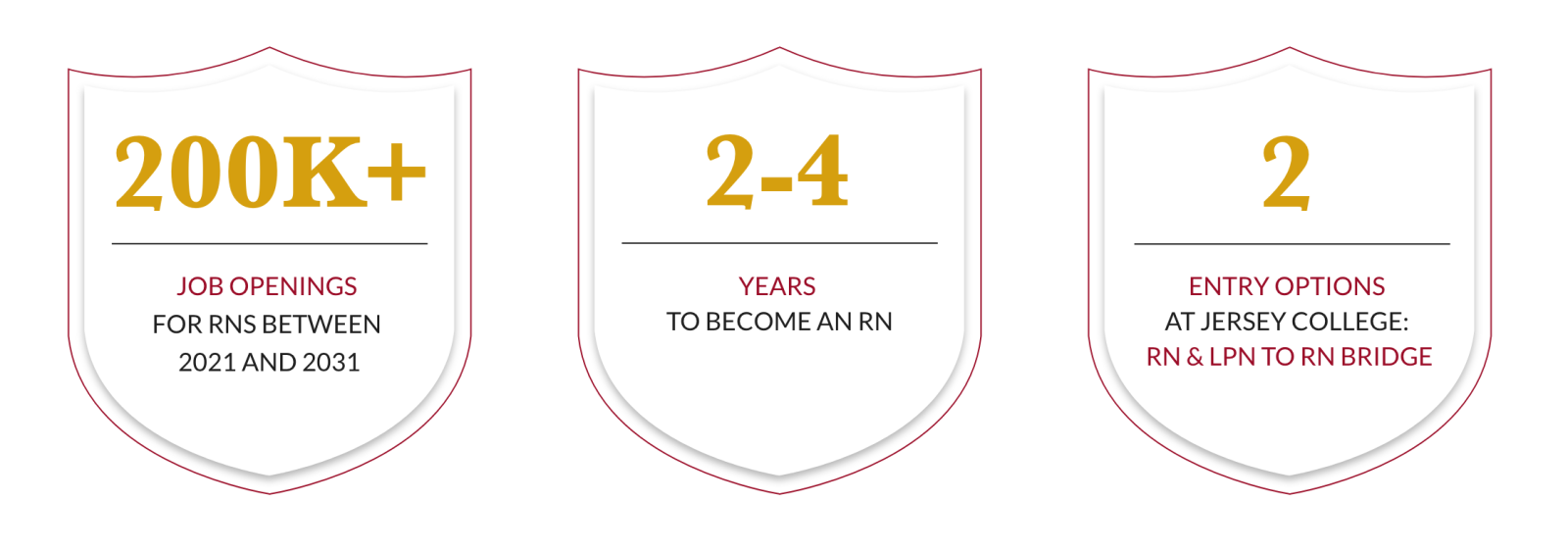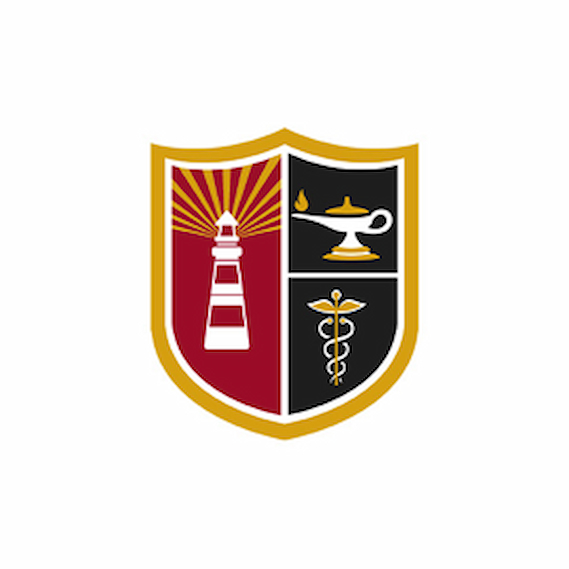
How to become a Registered Nurse (RN)
What is a Registered Nurse?
A registered nurse (RN) is a high-level healthcare professional who has completed the required training to earn a registered nursing license in their state. RNs provide individualized care for their patients whenever needed. They also issue orders to licensed practical nurses (LPNs) and make decisions about patient care, meaning they have a high level of responsibility and authority within their workplaces.
Duties of an RN may include:
- Assessing patients’ conditions
- Recording patients’ medical histories and symptoms
- Observing patients and recording the observations
- Consulting and collaborating with doctors and other healthcare professionals
- Operating and monitoring medical equipment
- Administering patients’ medication and treatments and monitoring for therapeutic effects
- Creating plans for patients’ care
- Educating patients and their families on how to manage illnesses or injuries
- Contributing information to existing plans with other members of the healthcare team
- Assisting with diagnostic tests and analyzing the results
- Provide discharge planning to patients and their family as they prepare to transition to the home environment
An RN can specialize in various fields, such as oncology, pediatrics, and hospice care.
LPNs who want to further their careers may study to become an RN. RNs seeking the next level of advancement may continue their studies in graduate programs to become clinical nurse specialists or nurse practitioners.
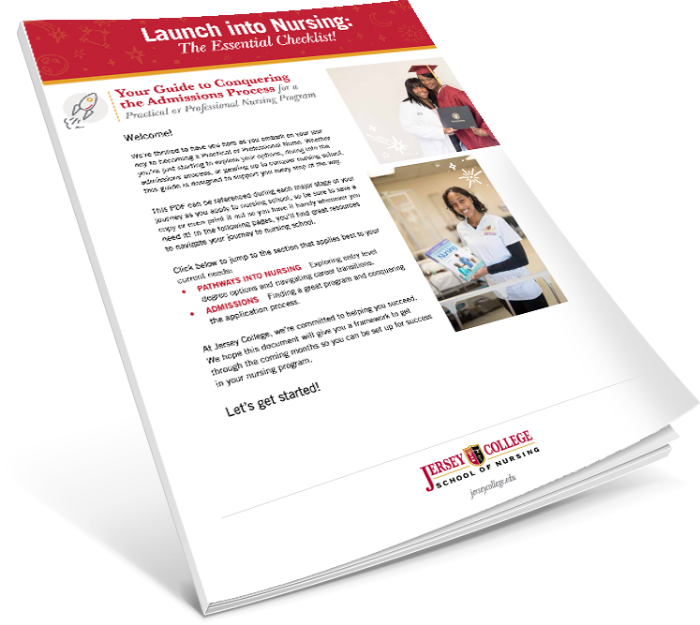
FREE Essential Guide to Nursing School: Get Accepted, Survive, and Thrive!
The Pros and Cons of Being an RN
Benefits
RNs may earn competitive salaries and often have flexible schedules that allow them to set their own hours. It is possible to have multiple options when looking for work, including public hospitals, private practices, and government agencies.
For instance, the Centers for Medicare & Medicaid Services is generally on the lookout for skilled and qualified registered nurses, meaning you may be able to gain access to the perks of government work along with the benefits of becoming an RN.
Drawbacks
Scheduling flexibility can also translate to working holidays and overnight shifts, which can be physically and mentally draining. Regular exposure to hazardous materials and contagious diseases is also part of the job.
What are the Steps to Becoming an RN?
- Earn your degree from a licensed ADN or BSN program. Choosing an RN program at Jersey College helps to provide you with extensive practical experience in labs and clinicals.
- Pass the NCLEX exam, get licensed in your state, and find employment.
- Earn your board certification and maintain it through continuing education.
If you're an LPN, you can climb to the next career level via the LPN-to-RN Bridge Program at Jersey College.
Educational Requirements
In general, two degrees are conferred on RNs, depending on their program.
- An ADN (Associate Degree in Nursing) program, such as the one offered by Jersey College, educates students without bachelor's degrees or prior training in nursing. Our curriculum follows a holistic model that teaches students how to care for patients' physical, emotional, mental, and spiritual needs, along with leadership and management skills. You can earn an associate's degree in just two years.
- A BSN (Bachelor of Science in Nursing) covers the same material as an ADN at a deeper level but takes a minimum of four years to complete. Note: you may also see “ABSN” means that it is an accelerated BSN program. These are generally for candidates who already have a bachelor's degree in another field from an accredited institution.
Learn more:
Credential Requirements
You must be licensed to work as an RN in a healthcare setting. After completing your degree coursework, clinical hours, and passing the NCLEX exam, getting licensed in your state is the final step to becoming a registered nurse. Each state has different requirements, and you may need to renew your license periodically through additional training courses.
Working as a Registered Nurse
RNs can work in operating rooms, ICUs, and neonatal care units in state, local, and private hospitals. They administer medications, prioritize patient care, delegate tasks to assistants, and handle emergencies.
In nursing homes and residential care centers, the responsibilities of RNs may include monitoring residents and advising families on the best care options while administering medication as needed.
RNs in ambulatory healthcare facilities work as dedicated support staff for doctors and other nurses. They collect patient data, administer medications, and monitor patients.
Work Settings
Specialization Opportunities
With the multitude of nursing specialties and healthcare settings, there can be a vast selection of employment opportunities for RNs.
There are many nursing specialties, which provide RNs with an assortment of job options. Below is a sample list of areas nurses may choose to work, shared from the Bureau of Labor Statistics:
- Addiction nurses care for patients who need help to overcome addictions to alcohol, drugs, and other substances.
- Cardiovascular nurses care for patients with heart disease and people who have had heart surgery.
- Critical care nurses work in intensive care units in hospitals, providing care to patients with serious, complex, and acute illnesses and injuries that need very close monitoring and treatment.
- Genetics nurses provide screening, counseling, and treatment for patients with genetic disorders, such as cystic fibrosis.
- Neonatology nurses take care of newborn babies.
- Nephrology nurses care for patients who have kidney-related health issues stemming from diabetes, high blood pressure, substance abuse, or other causes.
- Public health nurses promote public health by educating people on warning signs and symptoms of disease or managing chronic health conditions. They may also run health screenings, immunization clinics, blood drives, or other community outreach programs.
- Rehabilitation nurses care for patients with temporary or permanent disabilities.
Some nurses do not work directly with patients, but they must still have an active registered nurse license. For example, they may work as nurse educators, healthcare consultants, public policy advisors, researchers, hospital administrators, salespeople for pharmaceutical and medical supply companies, or as medical writers and editors
RN Salaries
How Much Do RNs Make?
The median annual wage for registered nurses was $77,600 in May 2021, according to the Bureau of Labor Statistics (BLS)1. Some factors that can play a role in RN salary include the state and city location of the job, type of work, and specialty.
Salary and employment in selected states are listed below from the BLS as of May 2021:
- Florida’s annual average RN salary was $72,000 with 187,920 RNs employed throughout the state.2
- New Jersey’s annual average RN salary was $82,720 with 79,530 RNs employed throughout the state.3
- Indiana's annual average RN salary was $68,890 with 66,800 RNs employed throughout the state.4
- Tennessee's annual average RN salary was $66,680 with 62,250 RNs employed throughout the state.5
- Pennsylvannia's annual average RN salary was $87,530 with 144,100 RNs employed throughout the state.6
The state in which you practice nursing and the degree level you attain play a role in salary for most occupations, considering the cost of living by state, visit our Nursing Salary Guide.
1 Bureau of Labor Statistics
2 Bureau of Labor Statistics - FL
3 Bureau of Labor Statistics - NJ
4 Bureau of Labor Statistics - IN
5 Bureau of Labor Statistics - TN
6 Bureau of Labor Statistics - PA
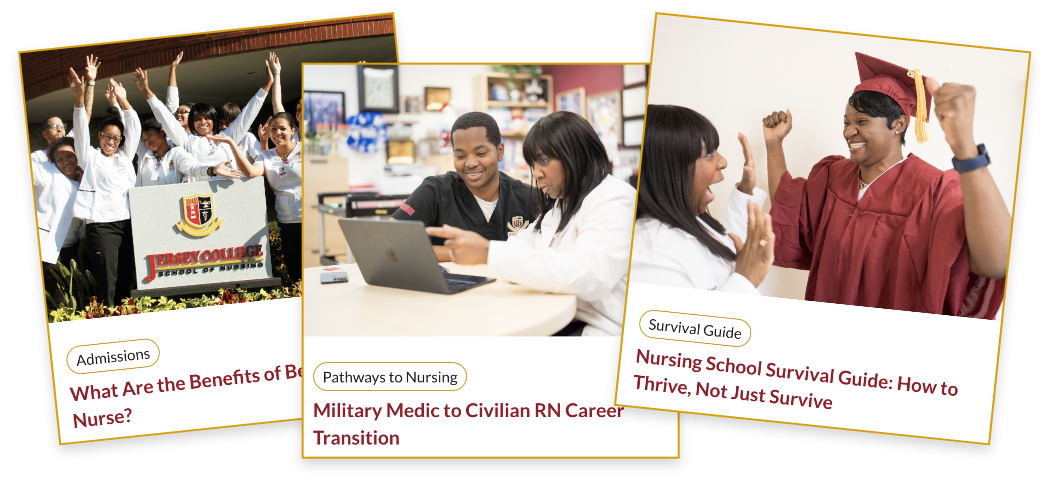
Sign up to get new articles in your inbox and stay updated on our nursing programs.
Resources for Current & Prospective RNs
- The National Council of State Boards of Nursing provides news, practice tests, licensing information, and access to exam notices for RNs.
- The Accreditation Commission for Education in Nursing is a specialized nursing accrediting agency with a directory of accredited programs.
- The Association for Nursing Professional Development is dedicated to advancing specialty practices for RNs.
- The American Association of Critical-Care Nurses provides information and community support for RNs specializing in acute and critical care.
Frequently Asked Questions
- Can you become an RN in 2 years?
Yes! While program lengths vary dependent upon schedules and credit loads, Jersey College's two-year ADN program can get you the necessary education to become and RN. Learn more about our RN program.
Program length is subject to change and is determined based on a number of factors, including, but not limited to: (i) pace of completion, (ii) quantity of credits taken per term, (iii) repeats of coursework, and (iv) leaves.
- What is accreditation, and why is it important?
Among other things, accreditation means a program is formally recognized as credible in its field.
Learn more about Accreditation & Licenses.
- What advancement opportunities are available after becoming an RN?
After earning your professional nursing associate’s degree, you can continue your education, specialize in a particular medical field, or pursue a career as a legal nurse consultant, researcher, or educator.
Learn more about nursing degree options and career paths.
Get Started
The first step to applying to Jersey College is to get in touch with the admissions department. Choose your location to view the contact information for your nearest campus!
Choose your location to view the contact information for your campus.
Find Your Campus
Based on the success of our programs, we have grown to serve communities in 7 states (and counting!). Find a campus near you to start your NurseLife.
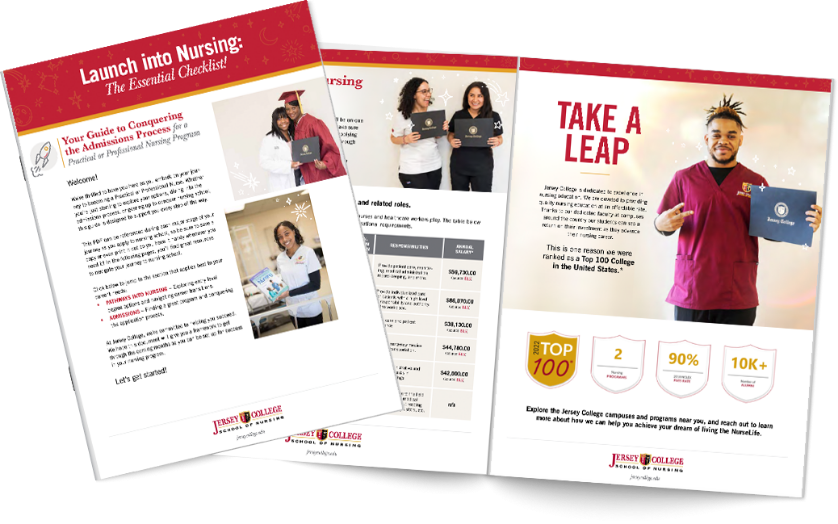
FREE Essential Guide to Nursing School: Get Accepted, Survive, and Thrive!
If you're not ready, take time to look over each Jersey College campus. Review the available programs, review our financial aid options, and request more information if needed!

